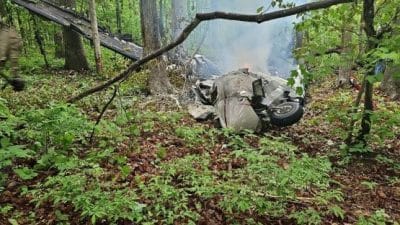Column by Jim Bishop

She and husband Dallas knew for some time that “something was wrong” with their youngest son. He had difficulty responding to voices, seldom maintained eye contact and wasn’t starting to talk.
They took Jacob to a hearing specialist, had numerous other tests done that were inconclusive and clung to the hope that he was just developmentally delayed in certain areas.
At age 2, Jacob was tested by specialists at Kluge Children’s Rehabilitation Center in Charlottesville. The official, distressing prognosis – autism spectrum disorder.
“We were in denial then and for some time afterward,” Jenny said. “This could happen to anyone, but we didn’t expect it to be us.”
The probability, however, keeps rising, as one in 150 children now born in the U.S. is diagnosed with autism, a brain development disorder that impairs social interaction and communication and causes restricted and repetitive behavior. While autism can be inherited, the genetic factors are complex, and it is generally unclear which genes may be responsible.
Behaviors vary widely for autistic children. Jacob struggles with structured activities, meaning he won’t stay long at the dinner table, nor does the family normally go out to a restaurant, although fast-food places usually work.
Changes in the environment and crowds of people over stimulate Jacob. When upset or trying to deal with sudden change, he will flap his hands or become tense or growl. He’ll often say “no!” even while going to do something he’s asked to do, then turns to do what is asked anyway.
Probably the hardest reality to deal with, Jenny said, is the few outward physical signs that a child is autistic. So, what do you do when your child suddenly throws a fit in a public place and people wonder why the parent doesn’t quickly intervene?
Jacob can entertain himself and obviously be happy for long periods of time, but often he will “obsess” over an activity, such as watching the same video repeatedly or focusing on certain objects or playthings. Right now it’s model dinosaurs; he knows all the different types of prehistoric animals and can pronounce perfectly their multisyllabic names.
He tends to play independently and loves being at home. He used to take special transportation to school but now rides the school bus with older brother, Dylan.
By age 3, Jacob was enrolled part time at Clymore Elementary School in Augusta County, receiving one-on-one help from autism specialist Gail Reese on socialization skills and speech. She started with basic sign language that Jenny and Jacob worked on at home.
Gail has now worked with Jacob four years – through preschool and kindergarten and now in first grade – on communication, academic and social skills, noting: “Jacob has really blossomed. We’ll keep assessing him to determine where he’s at developmentally.”
Jacob attended a summer program early on for autistic children held at James Madison University as well as some speech programs with JMU’s child development department.
“Where he has come from to where he is now, doing first grade work in a mainstream classroom, is remarkable,” Jenny stated. An Individual Education Plan helped identify Jacob’s special needs for services arranged through his classes at Clymore.
“Jacob needs to be mainstreamed,” said his first-grade teacher, Mary Peltz. “If a teacher is flexible, understanding and kind, a child like him will make it in this setting.
“Jacob is different in the way he learns and is tested, and he does things in his own time frame,” Mary stated. “He is doing well with reading, math is more difficult; he relates well to other children and is learning everything his classmates are.”
“Jacob is smart, remembers many things and is very loving. He doesn’t have that ‘blank look’ that many autistic children have,” Jenny said. “He’s starting to discern right from wrong and will often say repeatedly ‘I’m sorry’ long after a misdemeanor occurs.”
Jacob is drawn to people who are laid back and respond gently to him, Jenny noted.
“We are thrilled with the progress Jacob is making, with the way his teachers and others are helping with his special needs,” she said.
Without question, “early intervention” has made the difference with Jacob, a diagnosis at an early age that he is autistic and then working hard – it hasn’t been easy – to discover resources to help him.
One such source is the Shenandoah Valley Autism Partnership, a support for parents of autistic children. Jenny is treasurer of the group.
She is excited about an upcoming public awareness event, a 5K Walk/Run for Autism being held Saturday, Mar. 29, at Westover Park in Harrisonburg. The event is sponsored by JMU’s Gamma Sigma Sigma, Circle K and Phi Gamma Delta along with Harrisonburg Department of Parks and Recreation. Proceeds will benefit SVAP activities.
The walk/run will begin and end at Westover Park. Registration opens at 7:30 a.m. and the race begins at 9:30 a.m. Refreshments will be served, T-shirts given to early registrants and door prizes awarded. Yours truly will be emcee/announcer.
Anyone who is able to walk or run can participate, Jenny noted. Persons can register on-line at www.runwalkjog.com/autism. More information on the walk/race or on SVAP is available by calling Sally L. Chappel at 540.568.8095.
The Hummel family is well aware they’re walking a path with many uncertainties and obstacles. They worry that other children will “pick on” Jacob as he grows older and to what extent he will become self-sufficient.
But, they’re grateful for the help Jacob is getting and the major improvements he’s making. As Jenny often says, “We’re taking it one day at a time.”
Jm Bishop is public-information officer at Eastern Mennonite University. He can be contacted at [email protected].










